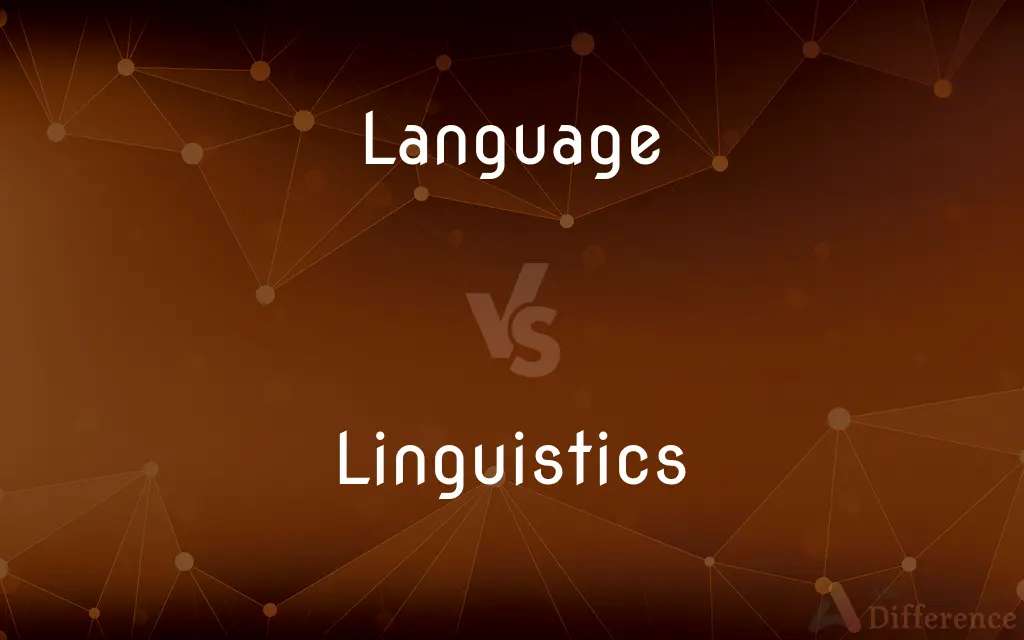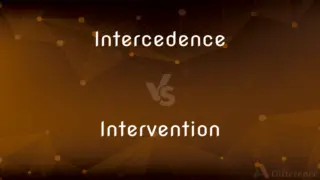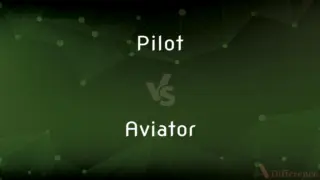Language vs. Linguistics — What's the Difference?
By Fiza Rafique & Maham Liaqat — Updated on March 18, 2024
Language is a system of communication using sounds or symbols, while linguistics is the scientific study of language and its structure, including phonetics, syntax, and semantics.

Difference Between Language and Linguistics
Table of Contents
ADVERTISEMENT
Key Differences
Language serves as a medium for communication, consisting of a set of sounds, symbols, and rules that enable people to convey ideas, emotions, and information. It is inherent to human culture and varies widely among different societies. Linguistics, on the other hand, is the academic discipline that investigates languages systematically, aiming to understand their structure, function, and development over time.
While language is used for practical communication in daily life, linguistics approaches language analytically, breaking it down into components like grammar, syntax, and phonology to study its underlying patterns and principles. Linguists study how languages evolve, how they are learned, and how they interact with cognitive and social factors, whereas language is the tool that embodies these dynamics in real-world use.
Languages manifest through speech, writing, and even non-verbal forms like sign languages, reflecting a vast diversity of cultural expressions and identities. Linguistics, conversely, employs a unified set of methodologies to analyze these diverse manifestations, seeking to uncover universal features of human language and specific characteristics of individual languages.
The study of linguistics not only includes the examination of well-documented languages but also the preservation and documentation of endangered languages. It contributes to the understanding of human cognition and cultural heritage, while the practice of language, in its myriad forms, is what creates the rich tapestry of human communication that linguistics aims to decode.
In the context of technology and artificial intelligence, linguistics provides theoretical foundations for natural language processing and language learning algorithms, demonstrating the interplay between language as a tool for communication and linguistics as a framework for understanding the capabilities and limitations of that tool.
ADVERTISEMENT
Comparison Chart
Definition
A system of communication using sounds, symbols, or gestures.
The scientific study of language and its structure.
Focus
Practical communication and cultural expression.
Analyzing and understanding the structure, function, and evolution of language.
Components
Sounds, words, grammar, semantics.
Phonetics, phonology, morphology, syntax, semantics, pragmatics.
Purpose
To convey ideas, emotions, and information.
To systematically investigate how languages work and evolve.
Application
Everyday communication, literature, media.
Academic research, language education, computational linguistics.
Compare with Definitions
Language
A system of spoken, written, or signed words used for communication.
English is a widely spoken language around the world.
Linguistics
An academic discipline focusing on the analysis of language.
He pursued a degree in linguistics to study phonetics.
Language
A set of conventions governing the use of symbols.
Programming languages use specific syntax and semantics to create software.
Linguistics
The examination of the relationship between language and cognition.
Psycholinguistics delves into how the brain processes language.
Language
The specific speech patterns and vocabulary of a group.
Teenagers often develop their own language.
Linguistics
The scientific analysis of language variation and change.
Historical linguistics explores the origins and evolution of languages.
Language
A means of expressing thoughts, feelings, and ideas.
Poetry is a beautiful expression of language.
Linguistics
The study of language structure and evolution.
Linguistics covers topics from syntax to sociolinguistics.
Language
The method of human communication, either spoken or written.
Sign language is as complex and nuanced as any spoken language.
Linguistics
The investigation of how languages are learned and used.
Applied linguistics often focuses on language education.
Language
A language is a structured system of communication used by humans, based on speech and gesture (spoken language), sign, or often writing. The structure of language is its grammar and the free components are its vocabulary.
Linguistics
Linguistics is the scientific study of language. It encompasses the analysis of every aspect of language, as well as the methods for studying and modeling them.
Language
Communication of thoughts and feelings through a system of arbitrary signals, such as voice sounds, gestures, or written symbols.
Linguistics
The study of the nature, structure, and variation of language, including phonetics, phonology, morphology, syntax, semantics, sociolinguistics, and pragmatics.
Language
Such a system including its rules for combining its components, such as words.
Linguistics
The scientific study of language.
Language
Such a system as used by a nation, people, or other distinct community; often contrasted with dialect.
Linguistics
The science of languages, or of the origin, signification, and application of words; glossology.
Language
A system of signs, symbols, gestures, or rules used in communicating
The language of algebra.
Linguistics
The scientific study of language
Language
(Computers) A system of symbols and rules used for communication with or between computers.
Linguistics
The humanistic study of language and literature
Language
Body language; kinesics.
Language
The special vocabulary and usages of a scientific, professional, or other group
"his total mastery of screen language—camera placement, editing—and his handling of actors" (Jack Kroll).
Language
A characteristic style of speech or writing
Shakespearean language.
Language
A particular manner of expression
Profane language.
Persuasive language.
Language
The manner or means of communication between living creatures other than humans
The language of dolphins.
Language
Verbal communication as a subject of study.
Language
The wording of a legal document or statute as distinct from the spirit.
Language
(countable) A body of words, and set of methods of combining them (called a grammar), understood by a community and used as a form of communication.
The English language and the German language are related.
Deaf and mute people communicate using languages like ASL.
Language
(uncountable) The ability to communicate using words.
The gift of language
Language
(uncountable) A sublanguage: the slang of a particular community or jargon of a particular specialist field.
Legal language;
The language of chemistry
Language
The expression of thought (the communication of meaning) in a specified way; that which communicates something, as language does.
Body language;
The language of the eyes
Language
A body of sounds, signs and/or signals by which animals communicate, and by which plants are sometimes also thought to communicate.
Language
A computer language; a machine language.
Language
(uncountable) Manner of expression.
Language
(uncountable) The particular words used in a speech or a passage of text.
The language used in the law does not permit any other interpretation.
The language he used to talk to me was obscene.
Language
(uncountable) Profanity.
Language
A languet, a flat plate in or below the flue pipe of an organ.
Language
To communicate by language; to express in language.
Language
An admonishment said in response to vulgar language.
Language
Any means of conveying or communicating ideas;
Language
The expression of ideas by writing, or any other instrumentality.
Language
The forms of speech, or the methods of expressing ideas, peculiar to a particular nation.
Language
The characteristic mode of arranging words, peculiar to an individual speaker or writer; manner of expression; style.
Others for language all their care express.
Language
The inarticulate sounds by which animals inferior to man express their feelings or their wants.
Language
The suggestion, by objects, actions, or conditions, of ideas associated therewith; as, the language of flowers.
There was . . . language in their very gesture.
Language
The vocabulary and phraseology belonging to an art or department of knowledge; as, medical language; the language of chemistry or theology.
Language
A race, as distinguished by its speech.
All the people, the nations, and the languages, fell down and worshiped the golden image.
Language
Any system of symbols created for the purpose of communicating ideas, emotions, commands, etc., between sentient agents.
Language
Any set of symbols and the rules for combining them which are used to specify to a computer the actions that it is to take; also referred to as a computer lanugage or programming language; as, JAVA is a new and flexible high-level language which has achieved popularity very rapidly.
Language
To communicate by language; to express in language.
Others were languaged in such doubtful expressions that they have a double sense.
Language
A systematic means of communicating by the use of sounds or conventional symbols;
He taught foreign languages
The language introduced is standard throughout the text
The speed with which a program can be executed depends on the language in which it is written
Language
(language) communication by word of mouth;
His speech was garbled
He uttered harsh language
He recorded the spoken language of the streets
Language
A system of words used in a particular discipline;
Legal terminology
The language of sociology
Language
The cognitive processes involved in producing and understanding linguistic communication;
He didn't have the language to express his feelings
Language
The mental faculty or power of vocal communication;
Language sets homo sapiens apart from all other animals
Language
The text of a popular song or musical-comedy number;
His compositions always started with the lyrics
He wrote both words and music
The song uses colloquial language
Common Curiosities
Can linguistics help in learning languages?
Yes, understanding linguistic principles can enhance language learning by providing insights into grammar, phonetics, and semantics.
What is language?
Language is a system of communication that employs sounds, symbols, or gestures to convey messages and express ideas and emotions.
What is linguistics?
Linguistics is the scientific study of language, focusing on understanding its structure, function, and evolution.
Is sign language considered a language in linguistics?
Yes, sign languages are fully recognized as languages in linguistics, with their own syntax, grammar, and cultural contexts.
Do linguists study all languages?
Linguists study a wide range of languages, from widely spoken languages to endangered and ancient languages.
What role does culture play in linguistics?
Culture significantly influences language development and use, which linguistics examines to understand language variation and change.
Can linguistic research affect language policy?
Yes, linguistic research can inform language policy decisions, such as bilingual education and language preservation initiatives.
What is the relationship between linguistics and psychology?
Psycholinguistics, a subfield of linguistics, explores the psychological processes involved in language comprehension and production.
What are the main components of language studied in linguistics?
Linguistics studies components like phonetics, morphology, syntax, semantics, and pragmatics.
How does linguistics differ from language?
Linguistics is the academic study that analyzes and describes languages, while language is the communication tool itself.
How does linguistics contribute to education?
Linguistics informs language teaching methodologies and curriculum design, aiming to improve language acquisition and literacy.
How does linguistics apply to artificial intelligence?
Linguistics informs natural language processing and AI by providing theoretical frameworks for understanding language structure and use.
What is the importance of preserving endangered languages?
Preserving endangered languages is crucial for maintaining cultural diversity and understanding human cognitive capacities.
How do linguists study language evolution?
Linguists use historical and comparative methods to trace language changes and reconstruct ancient languages.
What is computational linguistics?
Computational linguistics applies computer science to analyze and model natural language, enhancing technologies like speech recognition and machine translation.
Share Your Discovery

Previous Comparison
Intercedence vs. Intervention
Next Comparison
Pilot vs. AviatorAuthor Spotlight
Written by
Fiza RafiqueFiza Rafique is a skilled content writer at AskDifference.com, where she meticulously refines and enhances written pieces. Drawing from her vast editorial expertise, Fiza ensures clarity, accuracy, and precision in every article. Passionate about language, she continually seeks to elevate the quality of content for readers worldwide.
Co-written by
Maham Liaqat














































